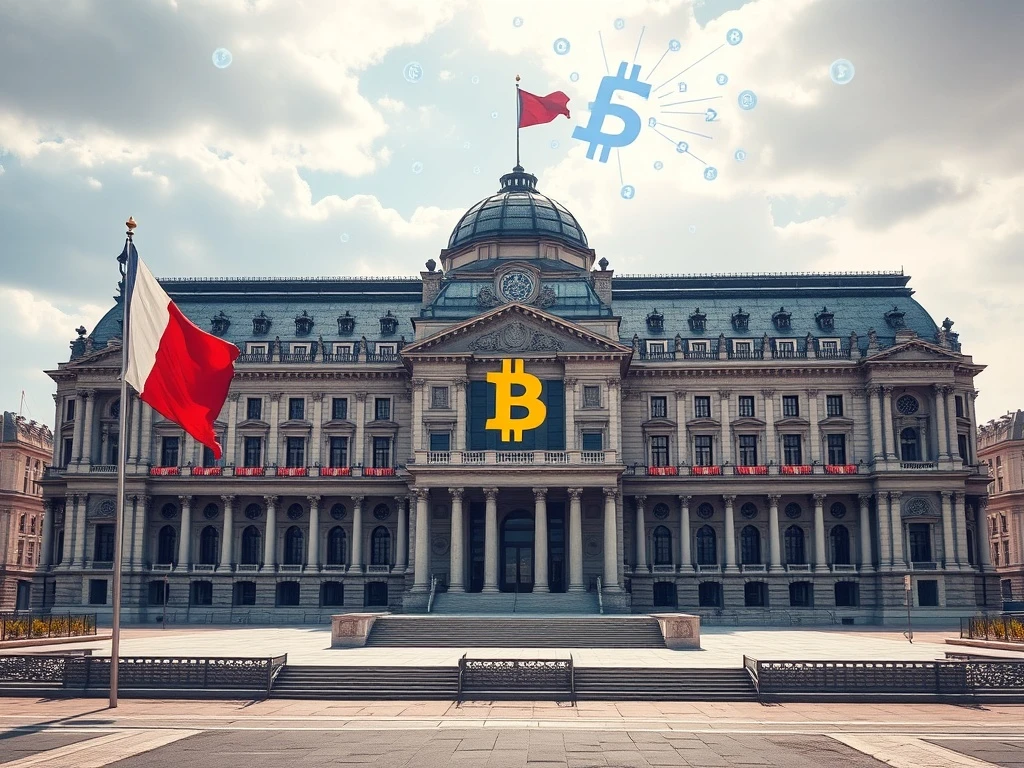Bitcoin France: Revolutionary Motion Seeks to Embrace Crypto, Ban CBDCs

A significant shift is underway in French politics. Lawmakers are set to review a pivotal proposal. This motion could profoundly reshape the country’s approach to digital currencies. It aims to ’embrace Bitcoin and cryptocurrencies’ while challenging traditional financial structures. This development is particularly crucial for individuals interested in the evolving landscape of French crypto regulation.
France’s Bold Stance on Digital Currencies
Éric Ciotti of the Union of the Right for the Republic spearheaded this impactful motion. He introduced a resolution on Wednesday. This proposal calls for France’s national assembly to ban the digital euro. The European Central Bank is currently pioneering this potential central bank digital currency (CBDC). Instead, the motion advocates for promoting “the dissemination of euro stablecoins and investment in crypto-assets.” This proactive stance highlights a growing debate. Many nations weigh the benefits of decentralized digital assets against state-controlled digital currencies.
The motion specifically cites the United States’ efforts. The US has worked to ban CBDCs and promote stablecoins. This was achieved through the GENIUS Act, signed into law in July. Consequently, France’s proposal aligns with a broader international trend. Governments are increasingly examining how digital assets integrate into national economies. Furthermore, this French initiative could set a precedent for other European nations. It demonstrates a clear preference for market-driven innovation over centralized digital currencies. This represents a critical moment for CBDC ban France discussions.
The Push for Stablecoin Adoption in France
The proposed European resolution urges the Government to advocate for a specific future. This framework relates to cryptoasset exposures. It calls for deviating from the 2022 Basel standard. This change would facilitate the pledging of cryptoassets. However, it maintains the objective of a substantial overhaul of these rules within the Basel Committee. Therefore, the motion prioritizes flexibility and innovation. It aims to create a more accommodating environment for digital assets. The emphasis on stablecoins is particularly notable.
Stablecoins offer a bridge between traditional fiat currencies and the crypto world. They maintain a stable value, often pegged to the euro or US dollar. This stability makes them attractive for various financial applications. Ciotti’s motion envisions a future where euro stablecoins play a significant role. They could enhance financial transactions and foster digital innovation. Ultimately, this focus supports Stablecoin adoption France as a key policy objective. Such a move could position France as a leader in this burgeoning sector within Europe.
Exploring a National Bitcoin France Reserve
While the motion did not explicitly mention establishing a national Bitcoin reserve, reports indicate Ciotti’s intentions. He reportedly aims for the French government to hold 2% of Bitcoin’s total supply. This amount was worth approximately $48 billion at the time of publication. Such a move would be groundbreaking. It would signal a profound commitment to digital assets at a national level. Moreover, this strategy mirrors efforts by the US government. The US has worked to establish strategic Bitcoin and crypto reserves. They often utilize tokens seized through criminal cases. For example, a recent $14-billion seizure could bolster these stockpiles.
The concept of governments holding Bitcoin is gaining traction globally. Willem Schroé, a Bitcoin OG, even suggests that Bitcoin treasuries can earn more Bitcoin. This highlights the potential for strategic asset management. A national Bitcoin France reserve could provide several benefits. It offers diversification, a hedge against inflation, and a strategic asset in the digital age. This discussion alone underscores the growing legitimacy of Bitcoin among policymakers.
Global Trend: Governments Building Crypto Reserves
France is not alone in exploring crypto reserve policies. Several other countries have begun examining similar options. For instance, Kyrgyzstan’s lawmakers reportedly started exploring the creation of a digital asset reserve. These discussions followed engagements with former Binance CEO Changpeng “CZ” Zhao. CZ now advises the government’s crypto committee. This collaboration demonstrates a willingness to engage with industry experts.
Meanwhile, one of Bhutan’s economic hubs announced plans in January. It intends to set up a strategic crypto reserve. This reserve would include Bitcoin and other tokens. These examples illustrate a broader global trend. Governments are recognizing the strategic importance of digital assets. They are considering them as part of national financial strategies. Therefore, the idea of Crypto reserves government initiatives is rapidly moving from niche concept to mainstream policy consideration.
The Future of French Crypto Regulation
The motion, as of Tuesday, had not yet been formally considered by French lawmakers. Nevertheless, its introduction marks a significant step. It represents a concrete effort to influence national policy on crypto and Bitcoin. This is not the first time French political parties have pushed for crypto-friendly policies. In August, the political party Rassemblement National reportedly advocated for the French government to mine Bitcoin. They proposed using surplus energy from the country’s nuclear power plants. This earlier initiative focused on leveraging existing national resources.
Ultimately, these proposals reflect a growing understanding. Digital assets are more than just a passing trend. They represent a fundamental shift in finance and technology. Should Ciotti’s motion gain traction, it could significantly impact French crypto regulation. It might pave the way for a more open and innovative digital asset landscape in France. This could also influence broader European Union policies. The debate signals a pivotal moment for digital currency adoption in a major European economy.








